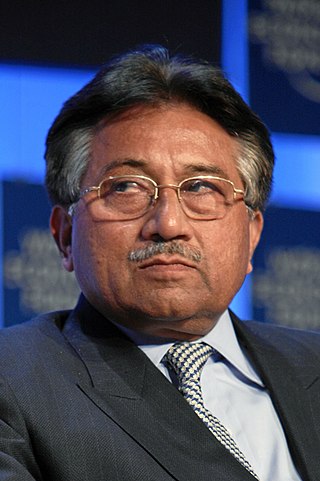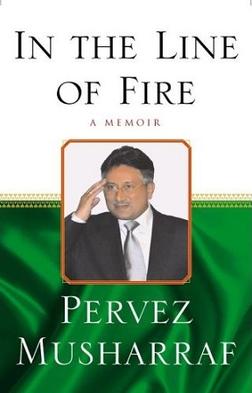
Pervez Musharraf was a Pakistani military officer and politician who served as the tenth president of Pakistan from 2001 to 2008. He also served as the 10th Chairman of the Joint Chiefs from 1998 to 2001 and the 7th Chief of Army Staff from 1998 to 2007.
Strategic depth is a term in military literature that broadly refers to the distances between the front lines or battle sectors and the combatants' industrial core areas, capital cities, heartlands, and other key centers of population or military production.
Lieutenant General Mahmud AhmedHI(M) is a retired Pakistani three-star rank army general who served as the Director-General of the Inter-Services Intelligence from 1999 to 2001.
Operation Tupac is the codename of an ongoing military-intelligence contingency program that has been active since the 1980s and run by Pakistan's main intelligence agency Inter-Services Intelligence (ISI). It has a three-part action plan to provide covert support to anti-India separatists and militants in the insurgency in Indan-administered Jammu and Kashmir. The program was authorized and initiated in 1988 by the order of the then-President of Pakistan, Muhammad Zia-ul-Haq.
The Agra summit was a historic two-day summit meeting between India and Pakistan which lasted from 14 to 16 July 2001. It was organized with the aim of resolving long-standing issues between India and Pakistan.

Air Chief Marshal Mushaf Ali MirNI(M), HI(M), SI(M), SBt was a Pakistani four-star air officer who served as the Chief of Air Staff of the Pakistan Air Force (PAF), appointed on 20 November 2000 until his accidental death in a plane crash on 20 February 2003.

General Muhammad Aziz KhanNI(M) HI(M) SBt TBt, best known as Aziz Khan, is a retired Pakistani four-star rank army general who served as the 11th Chairman of the Joint Chiefs of Staff Committee, appointed in October 2001 until his retirement in 2005.

Pakistan and the United States established relations on 15 August 1947, a day after the independence of Pakistan, when the United States became one of the first nations to recognize the country.

In the Line of Fire: A Memoir is a book that was written by former President of Pakistan Pervez Musharraf and first published on September 25, 2006. The book contains a collection of Musharraf's memories and is being marketed as his official autobiography.

The insurgency in Khyber Pakhtunkhwa, also known as the War in North-West Pakistan or Pakistan's war on terror, is an ongoing armed conflict involving Pakistan and Islamist militant groups such as the Tehrik-i-Taliban Pakistan (TTP), Jundallah, Lashkar-e-Islam (LeI), TNSM, al-Qaeda, and their Central Asian allies such as the ISIL–Khorasan (ISIL), Islamic Movement of Uzbekistan, East Turkistan Movement, Emirate of Caucasus, and elements of organized crime. Formerly a war, it is now a low-level insurgency as of 2017.

The war on terror, officially the Global War on Terrorism (GWOT), is a global military campaign initiated by the United States following the September 11 attacks and is the most recent global conflict spanning multiple wars. The main targets of the campaign are militant Islamist movements like Al-Qaeda, Taliban and their allies. Other major targets included the Ba'athist regime in Iraq, which was deposed in an invasion in 2003, and various militant factions that fought during the ensuing insurgency. After its territorial expansion in 2014, the Islamic State militia has also emerged as a key adversary of the United States.

Bruce O. Riedel is an American expert on U.S. security, South Asia, and counter-terrorism. He is currently a senior fellow in the Saban Center for Middle East Policy at the Brookings Institution, and a professor at Johns Hopkins School of Advanced International Studies. He also serves as a senior adviser at Albright Stonebridge Group.

Pakistan-Vietnam relations, or Pakistani-Vietnamese relations, refers to the bilateral relationship between the Socialist Republic of Vietnam and Islamic Republic of Pakistan. The relationship is largely based on mutual trade and international political cooperation between the two countries. Pakistan is represented in Vietnam by its embassy in Hanoi, and Vietnam also maintains an embassy in Islamabad. During the Cold War, Pakistan maintained close ties with the United States-led Western Bloc to counter rival India's allegiance with the Soviet Union and Eastern Bloc. Throughout the 1960s and 1970s, the United States was involved in the Vietnam War against Soviet-backed North Vietnam while in the same time period, Pakistan had engaged in two major wars with neighbouring India in 1965 and 1971, the latter of which resulted in a devastating defeat for Pakistan and saw the emergence of an independent Bangladesh. Due to the fact that Pakistan was an ally with the United States and had begun to indirectly wage war against the Soviets in Afghanistan with heavy U.S.−backing, relations became strained between the two, with Pakistan closing its diplomatic mission in Vietnam in 1980 and Vietnam doing the same in 1984. However, relations greatly improved in the 2000s, and Pakistan reopened its embassy in Hanoi in October 2000. Vietnam also reopened its embassy in Islamabad and trade office in Karachi in December and November 2005, respectively. Relations between the two countries have continued to remain friendly, with Vietnam expressing an interest in increased economic and military cooperation with Pakistan. The heads of both nations have in recent times paid official visits to each other, with Pakistani President Pervez Musharraf visiting Vietnam in May 2001 and Vietnamese President Trần Đức Lương also paying an official visit to Pakistan in March 2004. Throughout the following decade, several visits were made by various Vietnamese and Pakistani ministries to each other. A major part of Pakistan's pursuit to enhance its relationship with Vietnam is outlined in Pakistan's "Vision East Asia" strategy. The emergence of such a strategy came as a result of Pakistan's desire to balance its relations with Vietnam and other East Asian / Southeast Asian states by making an effort to circumvent Pakistan's close relationship with China and Vietnam's growing relationship with India—the former being a cause of concern for Vietnam due to its tense relationship with China and the latter being a cause of concern for Pakistan due to its rivalry and history of armed conflict with India.
Pakistan and state-sponsored terrorism refers to the involvement of Pakistan in terrorism through the backing of various designated terrorist organizations. Pakistan has been frequently accused by various countries, including its neighbours Afghanistan, Iran, and India, as well as by the United States, the United Kingdom, Germany, and France, of involvement in a variety of terrorist activities in both its local region of South Asia and beyond. Pakistan's northwestern tribal regions along the Afghanistan–Pakistan border have been described as an effective safe haven for terrorists by Western media and the United States Secretary of Defense, while India has accused Pakistan of perpetuating the insurgency in Jammu and Kashmir by providing financial support and armaments to militant groups, as well as by sending state-trained terrorists across the Line of Control and de jure India–Pakistan border to launch attacks in Indian-administered Kashmir and India proper, respectively. According to an analysis published by the Saban Center for Middle East Policy at the Brookings Institution in 2008, Pakistan was reportedly, "with the possible exception of Iran, perhaps the world's most active sponsor of terrorist groups... aiding these groups that pose a direct threat to the United States. Pakistan's active participation has caused thousands of deaths in the region; all these years Pakistan has been supportive to several terrorist groups despite several stern warnings from the international community." Daniel Byman, a professor and senior analyst of terrorism and security at the Center For Middle East Policy, also wrote that, "Pakistan is probably 2008's most active sponsor of terrorism". In 2018, the former Prime Minister of Pakistan, Nawaz Sharif, suggested that the Pakistani government played a role in the 2008 Mumbai attacks that were carried out by Lashkar-e-Taiba, a Pakistan-based Islamist terrorist group. In July 2019, Pakistani Prime Minister Imran Khan, on an official visit to the United States, acknowledged the presence of some 30,000–40,000 armed terrorists operating on Pakistani soil. He further stated that previous administrations were hiding this truth, particularly from the United States, for the last 15 years during the War on Terror.
For purposes of U.S. foreign policy, South Asia consists of Afghanistan, Bangladesh, Bhutan, India, the Maldives, Nepal, Pakistan, and Sri Lanka. The Assistant Secretary of State for South and Central Asian Affairs was Nisha Desai Biswal.
Pakistan's role in the War on Terror is a widely discussed topic among policy-makers of various countries, political analysts and international delegates around the world. Pakistan has simultaneously received allegations of harbouring and aiding terrorists and commendation for its anti-terror efforts. Since 2001, the country has also hosted millions of Afghan refugees who fled the war in Afghanistan.

Sartaj Aziz was a Pakistani economist and strategist, who had previously served as the deputy chairman of the Planning Commission of Pakistan, member of the federal cabinet as the de facto Minister for Foreign Affairs, a Federal Senator as well as the National Security Advisor.

The Afghanistan–Pakistan border barrier refers to the border barrier being built by Pakistan since March 2017 along its border with Afghanistan. The purpose of the barrier is to prevent terrorism, arms, and drug trafficking, as well as refugees, illegal immigration, smuggling and infiltration across the approximately 2,670-kilometre-long (1,660 mi) international border between Afghanistan and Pakistan.
Bleed India with a Thousand Cuts is a military doctrine followed by the Pakistani military against India. It consists of waging covert war against India using insurgents at multiple locations. According to scholar Aparna Pande, this view was put forward in various studies by the Pakistani military, particularly in its Staff College, Quetta. Peter Chalk and Christine Fair cite the former director of the Inter-Services Intelligence (ISI) explicating the strategy.
The Pakistan Armed Forces have been criticized for eroding democratic processes in Pakistan, for being the largest business conglomeration in the country and for excessive control over the domestic and foreign policies of Pakistan. Critics of the Pakistan Army, such as human rights activist Manzoor Pashteen, have been jailed while like-minded Pakistani citizens are warned against criticizing the military establishment. In Pakistan, the military is considered a part of what is known as The Establishment; they control the state through a backdoor and are a part of a working deep state.











